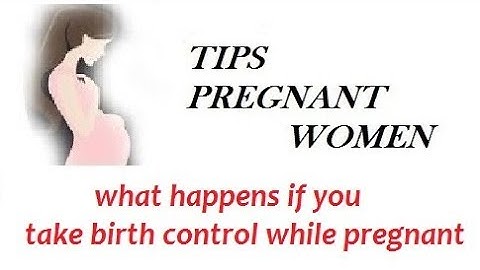Sex is great, but it can often be pegged as a taboo topic because of the many unwanted consequences that could come as a result of it. Sometimes it feels like there are so many ways in which sex can go wrong. The condom could break, you could forget to take the pill, or your birth control doesn't end up providing the protection you assumed it would. Sometimes, you may not even use a contraceptive at all, instead opting for the pullout method to protect you. But, as you probably already know, that's not the most effective form of birth control, mostly because of something called precum (or pre-ejaculation as One Medical Provider Dr. Natasha Bhuyan calls it). To learn more about precum and the chances that it could get you pregnant, I talked to Dr. Bhuyan to answer all your burning questions. Show
This content is imported from poll. You may be able to find the same content in another format, or you may be able to find more information, at their web site. What is precum?You might be asking, what even is precum? Basically, it's exactly what is sounds like. Precum is the "fluid that comes out of the penis during arousal," Dr. Bhuyan explains, before the sought after orgasm and ejaculation. While it's main intention is to act as a lubricant during sex, precum can carry some sperm, which is where people often run into a problem. Can you get pregnant from it? What are the chances?When a couple engages in the pullout method as a form of birth control, they aren't taking into account the sperm that is in precum. So, if you’re having sex with someone who has a penis and it’s removed before ejaculation, precum will have already been released, meaning there will be sperm inside the vagina. Dr. Bhuyan estimates that there is around a 14-24% chance that you can get pregnant from precum, even if you do pull out. How can you prevent precum from causing an unwanted pregnancy?The only way to prevent precum (or any cum, for that matter) from causing an unwanted pregnancy is by using a reliable form of birth control. Dr. Bhuyan suggests the pill, an IUD, a patch, or whatever you are comfortable with. She also states that it is important to use a condom "anytime there is contact between the vagina and penis." While this won't completely eliminate you chances of getting pregnant, it will decrease them greatly. If you have any other questions, reach out to your doctor. They will be sure to help you out by answering even your most embarrassing questions professionally and honestly.  Follow Carolyn on Instagram. Carolyn Twersky is an associate editor for Seventeen covering celebrities, entertainment, politics, trends, and health. On her off time, she's probably watching Ru Paul's Drag Race, traversing NYC for the best donuts, or, most likely, enjoying time in her favorite place in the world: her bed.
What is precum?Precum is a colorless fluid released by the penis during sexual arousal. It originates in the Cowper’s and Littre glands next to the urethra (below the prostate gland and along the urethra, respectively). Pre-ejaculate acts as a lubricant that allows sperm to easily pass through the urethra and eliminates discomfort during intercourse. It also neutralizes the acidity of both urine and the vagina, which may harm sperm, to establish a more alkaline environment that’s more sperm-friendly. Can you get pregnant from precum while ovulating?Although it’s uncommon, it is possible to get pregnant from precum during ovulation. It all depends on whether the precum contains sperm. Research shows that some people produce precum that contains sperm, while others do not. In a 2010 study, 37 percent of pre-ejaculatory fluid samples had a high enough proportion of motile sperm to indicate there was a chance it could fertilize an egg. Normally, sperm can survive in the female reproductive tract for up to five days. If an egg is released during ovulation in this window, the chances of conception are high. Want to find out when you're likely to be ovulating? Try this ovulation calculator for a prediction based on your cycle. Take a quizFind out what you can do with our Health Assistant Pre-ejaculate is released the moment the penis becomes erect, so precum is likely to be present during intercourse, even in the absence of ejaculation. If the pre-ejaculate has any active sperm that make their way into the uterine tubes, pregnancy is possible. So can you get pregnant from precum while ovulating? Yes. Lastly, note that sexually transmitted infections (STIs) can also be contracted through precum. To protect against STIs and unintended pregnancy, make sure to practice safe sex by using condoms.
 What if it’s not during ovulation?Precum can lead to pregnancy even if sex doesn’t happen during ovulation. How does this happen? As mentioned, sperm can survive for up to five days inside the female reproductive tract. If sperm are still alive when ovulation begins, conception can occur. One option to try to avoid an unplanned pregnancy is to track your cycle with an ovulation test. However, this method isn’t completely effective. Ovulation tests measure the levels of luteinizing hormone (LH), which if particularly high, will trigger ovulation. Ovulation tests can only detect an LH surge 24 to 36 hours before ovulation. The life expectancy of sperm, on the other hand, is much longer than that. So, having sex before discovering an LH surge could result in pregnancy. That’s why ovulation tracking is an unreliable form of contraception. Options for emergency contraceptionEmergency contraception, often referred to as the morning-after pill or post-coital contraception, helps prevent unintended pregnancy. It’s specifically designed for emergencies such as:
It’s critical to remember that emergency contraception will not cause an abortion or protect against STIs like HIV, chlamydia, and gonorrhea. There are two main types of emergency contraception:
 Morning-after pillsThe morning-after pill is the most popular type of emergency contraception pill (ECP), and according to studies, it can reduce the chances of pregnancy by 98 percent. Morning-after pills are classified into two broad categories:
Health care providers can also administer combined oral contraceptives as emergency contraception pills, but they are not as effective as levonorgestrel or ulipristal acetate. ECPs don’t work for everyone. Research has shown that levonorgestrel has minimal impact on people who are overweight or obese. It’s similarly ineffective if taken five or more days after unprotected sex. Furthermore, patients with chronic underlying conditions (especially those on medication) should seek medical advice before taking ECPs. Emergency intrauterine devicesOf all the options available, the most effective emergency IUD contraceptive is the copper IUD (also known as the coil). To prevent pregnancy, a health care provider can insert a copper IUD in the uterine cavity within 120 hours (or five days) of unprotected sex. Copper IUDs work by causing an inflammatory response in the uterus that makes it uninhabitable for sperm and unsuitable for fertilization. Copper IUDs can last for more than five years once inserted. Although it’s possible to use IUDs at any age to prevent pregnancy, IUDs are not suitable for those with the following conditions:
The process of copper IUD contraception is reversible, and once removed, fertility is immediately restored for most people. Copper IUDs for birth control are only available by prescription because they have to be inserted by a qualified health care provider. After the procedure, some people experience mild pain or discomfort, but it should subside fairly quickly. Certain serious side effects have been associated with copper IUDs, including heavy menstrual bleeding and chronic pain, infections, and damage to the uterus. If these symptoms don’t go away or get worse, it might be necessary to remove the coil. When to take a pregnancy testEven though it’s quite rare, it is possible to get pregnant while on birth control. However, some methods alter the menstrual cycle, so a missed period doesn’t always mean pregnancy. Several other factors can cause a delayed period, such as changes in diet, illness, stress, or excessive physical activity. If you’re on birth control and miss a period, consider seeing a health care provider or taking a pregnancy test to be sure. Some other symptoms that can indicate pregnancy include:
Other warning signs of pregnancy include nausea, frequent urination, and fatigue. When to see a health care provider
 If you’re receiving negative pregnancy test results, along with symptoms that point to pregnancy, consult a health care provider. An ectopic pregnancy displays signs of early pregnancy as well as severe abdominal pain, dizziness, and spotting. It’s an issue that requires immediate attention. A health care provider can perform all the necessary exams and lab work to determine whether it’s an ectopic pregnancy. Can you get pregnant from precum while ovulating? It’s definitely possible, although it’s not very common. The best defense against unplanned pregnancy is the use of condoms, birth control pills, IUDs, or other forms of contraception. Does birth control prevent Precum pregnancy?So to answer your question, if you're on the pill, you're protected from pregnancy, even if semen gets in your vagina. (And just so you know, the chance of getting pregnant from pre-cum is really, really small — pre-cum often doesn't even contain sperm.)
How effective is pulling out while on birth control?So in real life, about 22 out of 100 people who use withdrawal get pregnant every year — that's about 1 in 5. The reality is withdrawal isn't as effective as other types of birth control, but it's definitely better than not using anything at all.
Can you get pregnant on birth control and pullIs it possible? Yes. You can get pregnant from the pull-out method. The pull-out method, also called withdrawal — or coitus interruptus if you wanna get fancy — involves pulling the penis out of the vagina before ejaculation.
|

Related Posts
Advertising
LATEST NEWS
Advertising
Populer
Advertising
About

Copyright © 2024 kemunculan Inc.


















